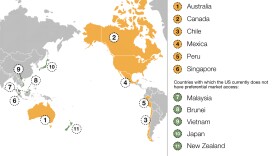By Brian Clardy
http://stream.publicbroadcasting.net/production/mp3/wkms/local-wkms-874004.mp3
Murray, KY – Murray State history professor Doctor Brian Clardy explains the diplomatic necessity of President Barack Obama's Nobel Peace Prize acceptance speech, to be delivered December 9th.
On December 9, President Barack Obama will become only the third sitting Chief Executive to receive the Nobel Peace Prize. This award is perhaps the greatest honor that any global citizen can have, but with it comes an opportunity to speak to a global audience about the necessity of peace and articulate plans for how this award (and their international celebrity) can enable the recipient to transform the current order a just global society.
However, this recipient has an even greater challenge to accomplish that goal than either Presidents Woodrow Wilson or Theodore Roosevelt at the start of the Twentieth Century. Obama's 2008 campaign speeches, as well as well meaning his cooperative musings during the Inaugural Address (as well as in other global settings) are yet to be categorized into a clear vision by which he can consistently conduct American foreign policy. However, his December Oslo speech will give him a once in a lifetime opportunity to announce and discuss the Obama Doctrine to a wide global audience.
This speech should pointedly address the Israeli-Palestinian issue that leaves no doubt as to the goals that the U.S. seeks to achieve in the broader Middle East. It must include a clarion call to offer reasonable incentives to bring Mahmud Abbas and Benjamin Netanyahu to the table to negotiate a viable two state solution (which is easy) as well as the right of return for Palestinian refugees and the resolution of Jerusalem's status (both of which are extremely difficult, but necessary) to achieve a lasting peace.
Moreover, the President should openly recognize that that the current Non-Proliferation regime is fatally flawed, broken and irrelevant to today's strategic concerns. This speech will give him the chance to garner international consensus on how to establish a new and technologically sound non-proliferation framework that can easily dissuade rogue states from acquiring nuclear, chemical or biological weapons technology or supplying them to non state terrorist groups. Here, the President announce his intention to forge a pragmatic Quintet comprised of the US, the Russian Federation, China, the European Union and the UN to begin the process of talks in either Salzburg, Vienna, or Geneva so that a new non-proliferation system can be put in place immediately to avert a potential disaster.
As part of a credible Sino-American policy, the President's speech on the status of Washington-Beijing relations would be an excellent follow up to his recent trip to China as he could express his concern about the issue of human rights and the broader issue of Tibet. Here, he must walk a proverbial tight rope and not give the impression that he is interfering in Beijing's domestic affairs; if he does that, he will alienate a key ally. But this would be the perfect forum to put some practical pressures on President Hu Jinatao to reexamine its stand on negotiating in good faith with the representatives of the Dalai Lama, resulting in the resolution of this decades long (and tragic) controversy.
And as a vital component of his broader policies toward the African continent, the President should go beyond the oratory of his speech in Accra, Ghana and state a global case for enabling African nations to become self-sufficient, healthy, and less autocratic political systems.
If President Obama is able to address these and a myriad of issues on such a grand stage and scale, it will enable him to forge bipartisan consensus on foreign policy at home, put the enemies of freedom on notice, and allow the United States to be that transformative force for change than he has envisioned since the campaign and in the days of his new and unique presidency.
Dr. Brian Clardy teaches 20th Century United States diplomatic history at Murray State University and is the host of Caf Jazz on Thursday nights.





